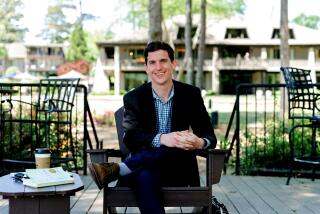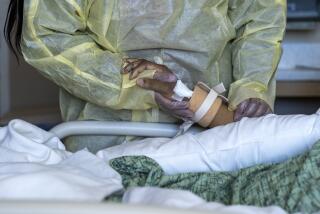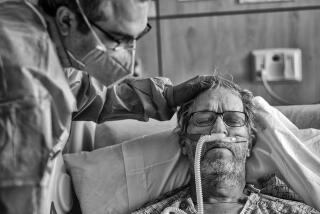In Liberia, one woman’s singular fight against Ebola
- Share via
Reporting from Vai Town, Liberia — Local doctors were horrified. Fatu Kekula was trying to care for her family, sick with Ebola, at home using nothing more than plastic trash bags, a raincoat bought in the market, boots, a surgical mask and gloves.
They called, urging her to be sensible.
“Doctors called and told me to leave them right alone and not go anywhere near them,” the 22-year-old nursing student said. “I couldn’t. They’re my only family.
“When your family get ill, you know that the virus is deadly. But your family is your family.”
In recent months, Liberia has suffered a severe shortage of treatment beds, with many people turned away, forced to go home, dying terrible deaths and infecting family members who tried to help them.
The beds shortage has eased in recent days. But Fatu’s story is testament to the grief and confusion family members feel, when urged by authorities and health workers not to touch sick family members. Most simply go into denial and treat them anyway, without taking precautions.
In August, Fatu’s father, Moses; mother, Victoria; sister Vivienne; and a young cousin, Alfred Wennie, 14, who had been taken in by the Kekulas as a foster child, all fell desperately ill with Ebola. Every day, Fatu said, she called for an ambulance and begged for help. For more than two weeks, none came.
“No one came near me. No one! I were all alone, all alone,” she said.
Her unorthodox solution helped protect her as she worked around the clock to save them. It may not be an option that can be applied widely, however, because most Liberians lack the knowledge or resources to do what she did.
Fatu had been away at a relative’s home in Grand Bassa County when her father, a 52-year-old administrator at a local clinic, got sick July 29. About a week earlier, he had been diagnosed with typhoid and given a bed that had just been vacated by an Ebola patient in the clinic where he worked.
His wife, Victoria, sent her four youngest foster children away and did her best to care for him, but when he weakened dramatically, with vomiting and diarrhea, she called Fatu home Aug. 3.
Fatu and her sister, Vivienne, took Moses by taxi, 90 minutes on punishing roads, to Monrovia, but no Ebola treatment unit could take him. On the ride back, Fatu made her plan.
“Since I know small, small medicine, I said, ‘God, with my faith I’m going to get my father home, and he’ll survive.’”
She set up a makeshift isolation room in a spare unfinished room outside the house. She bought raincoats, rain boots, chlorine and other supplies. Then she went to work.
When she entered her father’s treatment room she put on socks, plastic bags donned like waders, rain boots, four sets of gloves, a coat, a mask and a plastic bag over her hair. He wouldn’t eat. Carefully, she put in an intravenous drip. She poured rehydration liquids down his throat, drop by drop.
She gave him blood pressure medicine, antibiotics, analgesics for his fever and splitting headache. She even gave him an antiretroviral medicine normally used to save the lives of AIDS patients.
“He was restless. I did his blood pressure and it was very low, and I was afraid that he might die,” she said.
Moses Kekula was struggling to breathe, with a shattering headache, aches all over his body.
“I was almost like giving up. I kept praying to survive,” he recalled.
A week later, just as he was beginning to show signs of improvement, his wife became sick. Then the disease struck daughter Vivienne and her cousin, who’d been sent to live with them by his father, a farmer.
Around the clock, one or the other of them would be weakly calling Fatu for help. She dozed 15 minutes here, 30 minutes there.
“It was a bit difficult for me to sleep because all the time they would call me, maybe two of them would call me at the same time. Every time I would go into a dangerous room, I would dress up,” she said.
“The whole virus thing, it’s like carrying a baby in your hands, because it turns them into a child. You have to be sorry for them. You have to put yourself into the shoes of that person and ask yourself, ‘What if it were me?’”
She went through four boxes of surgical gloves, and bags of raincoats. When she took off the clothing, she had to shrug it off carefully to avoid touching the exterior. She sprayed copiously with chlorinated water. She carefully burned all the waste.
She swiftly burned through the $600 in her bank account.
“My approach was just to treat them based on their symptoms. I never felt tired. I was fighting for my family and their lives. I would do it for other people in the hospital so I knew I could do it for my family.”
On the 18th day, as Alfred’s condition swiftly declined, an ambulance arrived. She watched it depart with her family members, fear gripping her heart. Would she see them again?
“I was worried. I worried a lot because my entire family went there. They had the symptoms of the virus, and the virus had no cure.”
She prayed as hard as she could that their Ebola tests would be negative. All would come back positive.
Outside John F. Kennedy Medical Center, Alfred collapsed, convulsing.
“He said, ‘Aunty, I want to lie down,’” Victoria said. There were no beds inside, so Moses, Victoria, Vivienne and Alfred were given mattresses lined up next to each on the floor. Alfred’s skin became hot, he started bleeding from his mouth, convulsing again.
When Victoria awoke the next morning at 5, she saw Alfred, her foster child, just a yard away on the next mattress, drenched in blood from his head.
“I was afraid to touch him,” she said. “Then I saw he wasn’t breathing.
“I cried. I said ‘It’s a shame on me, because I took somebody’s child, a relative’s child, and he died in my hands.’”
Victoria’s health declined sharply, she began ranting unintelligibly, her skin broke out in a rash. But she would ultimately survive.
After helping her family, Fatu wants to spread hope, passing her knowledge on to other desperate families. She addressed workshops organized by the Ministry of Health, teaching people how to use plastic bags to protect themselves when there’s nothing else.
“I’m going to teach them the things I’ve already done, because I treated four people, and only one died,” she said.
Follow @RobynDixon_LAT for news from Africa
More to Read
Sign up for Essential California
The most important California stories and recommendations in your inbox every morning.
You may occasionally receive promotional content from the Los Angeles Times.













